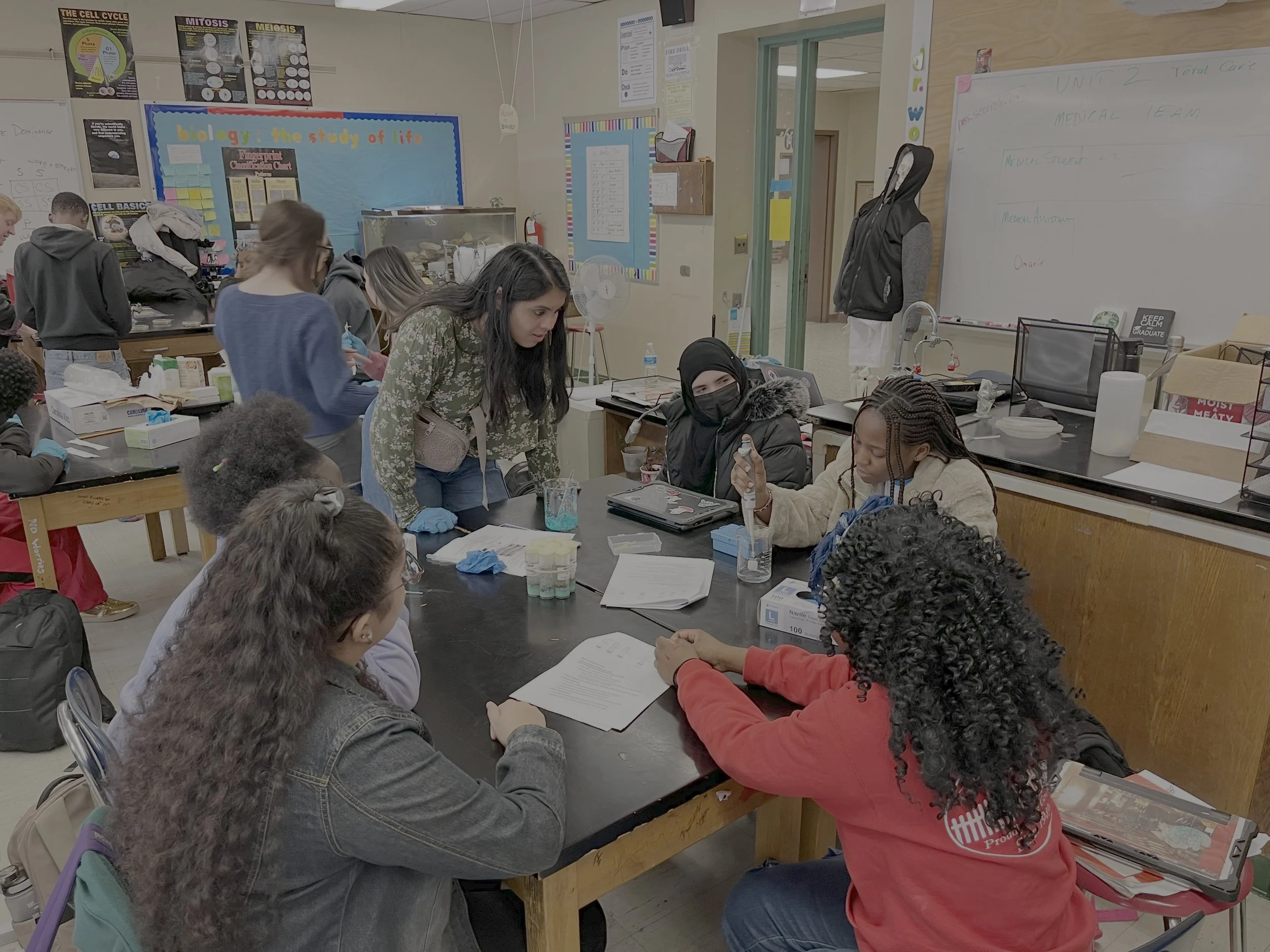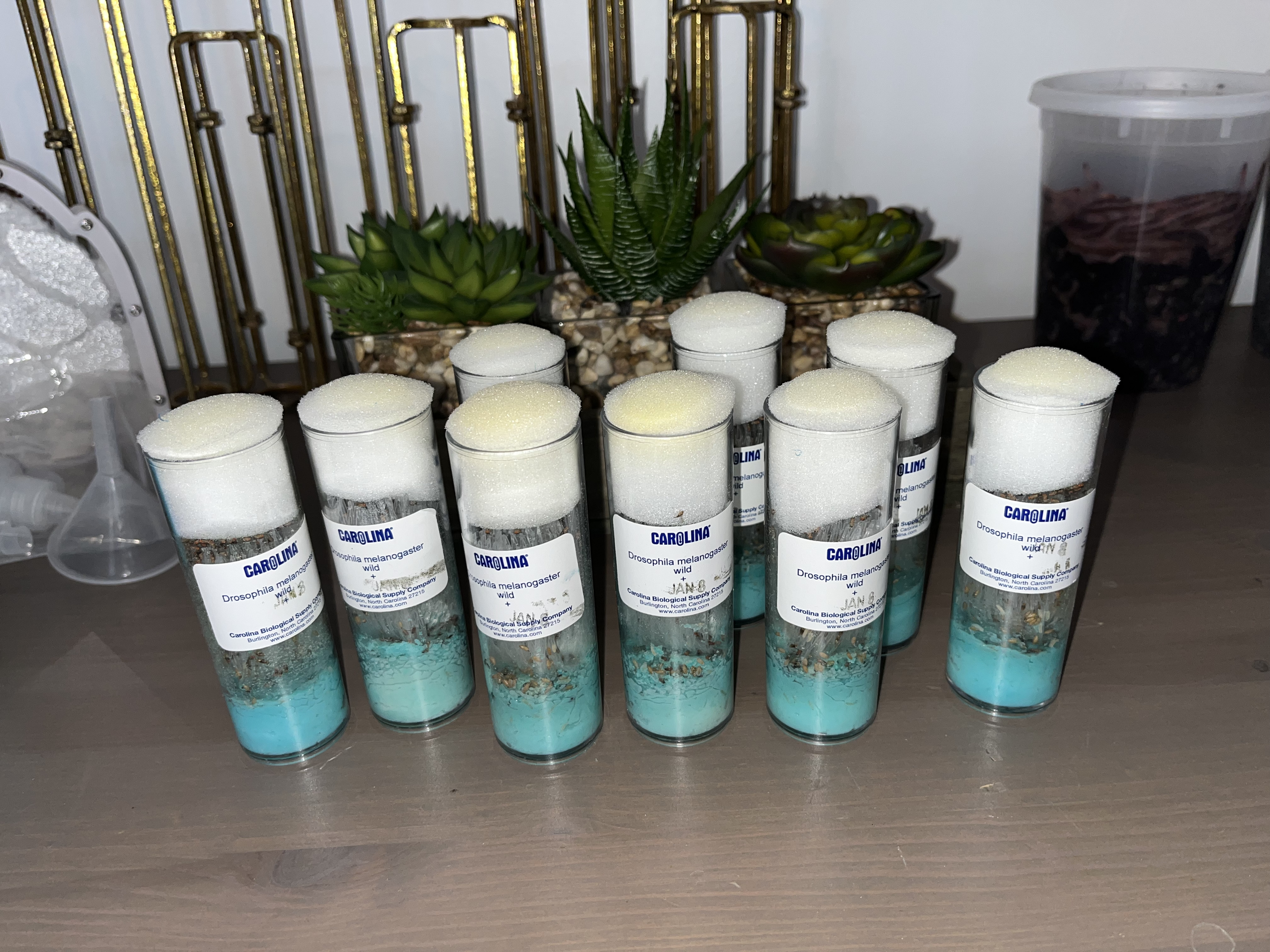January 2025
Developing pipette skills!
Lincoln-West Experiments
Hands-on experiments have officially begun at Lincoln-West School of Science and Health! We are thrilled that 17 innovative projects are underway, spread across eight different 9th- and 10th-grade classes. Despite the frigid Cleveland temperatures delaying the start of these projects, the students eagerly hit the ground running on January 28th. They reviewed their protocols, set up lab equipment, became acquainted with model organisms, and began working on their projects.
Here are a couple of project highlights:
Spicy Flies: The goal of this project is to determine the impact of spicy foods on our health. This will involve different behavioral and molecular tests using fruit flies. The students will be using capsaicin and AITC to explore this idea. Capsaicin is the chemical that makes peppers like chiles spicy, while a different chemical, allyl isothiocyanate (AITC), makes wasabi spicy. It is known that AITC activates a receptor in fruit flies called painless, which allows them to respond to painful and aversive stimuli. However, capsaicin is not reactive as “pain,” and it is not known if there is a receptor in fruit flies that can sense capsaicin (in humans, it is a special receptor called TRPV1). In addition, both capsaicin and AITC are thought to have antioxidant properties (beneficial), so it will be really interesting to see the results of these experiments!
Healthy Eating: The goal of this study is to determine how eating preserved meats like salami and bologna impacts DNA damage and phenotype in fruit flies. Nitrates and nitrites are often added to meat products to help preserve them for long-term storage. Nitrates are naturally occurring molecules made up of nitrogen and oxygen. Typically, they are ingested when we eat fruits and vegetables. Past research has shown that excess nitrates can lead to DNA damage, which may ultimately lead to cancer. To mimic the effects of eating preserved meat, sodium nitrate will be fed to fruit flies. Then, students will determine how the nitrates affect the DNA and development of the fruit flies by performing a western blot.
Ant-coholism: The goal of this project is to understand if alcohol abuse and dependence lead to changes in behavior. We will test this using a social species, ants (photo below), by creating two separate ant environments: one that is healthy and one that has been chronically exposed to alcohol. Every week, students will change the amount of sugar diluting the alcohol and measure the ants' behavior and tunnel formation. In the final week of live ant experiments, they will conduct a preference test to see if ants prefer alcohol after being exposed to it for several weeks. Then, students will dissect the ant brain to see if there is a change in a social anxiety-related protein called CBP to determine if alcohol exposure leads to direct changes in the molecules inside the brain.
We will highlight more projects in the months to come, including results and relevant data!
Ant housing
Garrett Morgan Projects
On January 17th, dozens of scientists from Case Western Reserve University and Cleveland Clinic attended our study section to score grant proposals from Garrett Morgan. There were 59 novel and well-thought-out submissions for the group to discuss. After each grant was scored, we settled on seven projects to carry out in the 9th- and 10th-grade classes we serve at Garrett Morgan. Our Scientific Officers are now writing detailed experimental protocols for the students to follow (with help from our volunteers). Once these are finished, we will begin ordering all the supplies and equipment needed for the students to complete their projects. We will be back in these classrooms in early February!
Funded Project Ideas for 2025:
Regeneration:
We had multiple proposals focused on cell regeneration in planaria and plants. These projects aim to better understand injuries and the healing process.
Anesthesia:
Anesthesia is commonly used in hospitals and in our projects (we use FlyNap to put fruit flies to sleep). This student wants to learn more about the impact of repeated exposure to anesthesia and its long-term effects.
Vaping While Pregnant:
Vaping has been our most popular topic across schools this year. This project aims to better understand the impact of vape smoke on reproduction and pregnancy. The study will involve removing adult flies from a tube, leaving behind only eggs, larvae, and pupae for ex utero exposure.
Alcohol:
Alcohol is widely consumed, but we still do not fully understand its impact on human longevity. Just this year, there have been conflicting reports from the National Academies of Sciences, Engineering, and Medicine and the U.S. Surgeon General. This project will use fruit flies to potentially provide more clarity.
Social Isolation in Ants:
Many of our students were profoundly impacted by the COVID shutdowns in the past few years. This project aims to study the effects of social isolation on serotonin levels in ants.
Sleeping Pills:
We all know sleep is vital to our short- and long-term health outcomes. This project will use fruit flies to learn more about the effects of different over-the-counter sleep aids.
Vape vs. Smoke:
The goal of this project is to determine whether vape smoke is better for health than cigarette smoke. Students will compare multiple variables in a model organism to answer this question. After exposing fruit flies to no smoke, vape smoke, or cigarette smoke, they will observe behavioral changes, changes in lifespan, and DNA damage.
Drosophila


